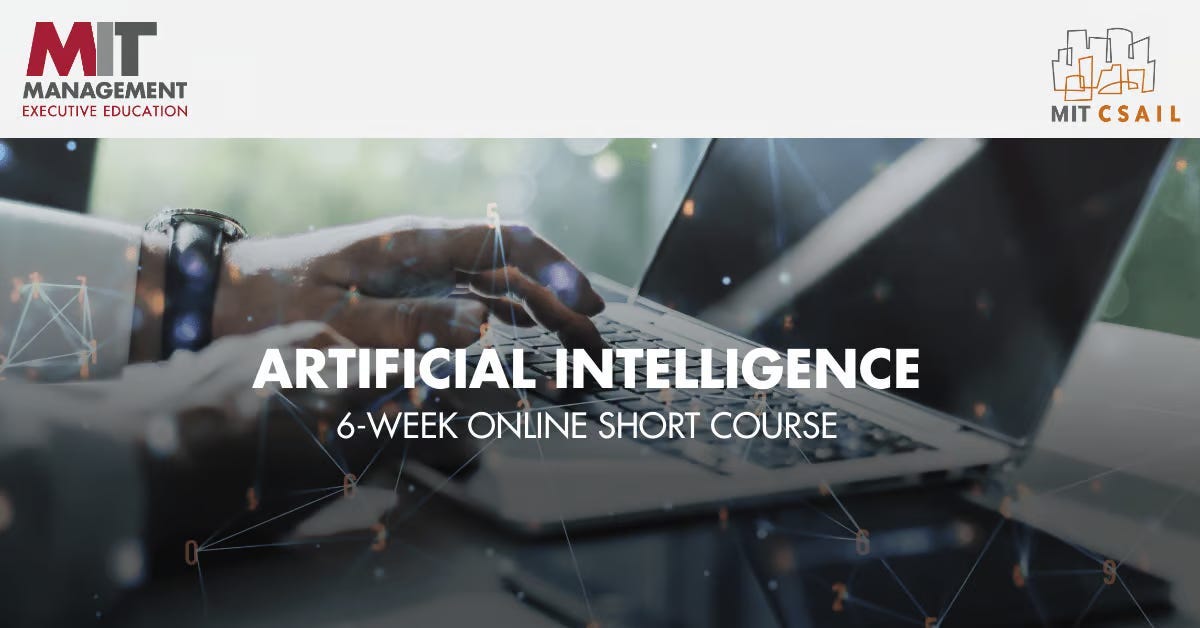The next industrial revolution has begun - CEO, NVIDIA
AI is putting the silicon back in silicon valley
“The next industrial revolution has begun,” CEO, NVIDIA, Jensen Huang
AI is putting the silicon back in silicon valley
AI billionaires club looks like a new gilded age
Artificial Intelligence online short course from MIT
Study artificial intelligence and gain the knowledge to support its integration into your organization. If you're looking to gain a competitive edge in today's business world, then this artificial intelligence online course may be the perfect option for you.
On completion of the MIT Artificial Intelligence: Implications for Business Strategy online short course, you’ll gain:
Key AI management and leadership insights to support informed, strategic decision making.
A practical grounding in AI and its business applications, helping you to transform your organization into a future-forward business.
A road map for the strategic implementation of AI technologies in a business context.
***
“The next industrial revolution has begun,” CEO, NVIDIA, Jensen Huang
Nvidia CEO Jensen Huang declared that "the next industrial revolution has begun," highlighting AI's potential to boost productivity across industries, enhance cost and energy efficiency, and unlock new revenue streams. This optimistic vision underscores Nvidia's leading role in the AI boom, with its AI accelerators—crucial for developing chatbots and other advanced tools—becoming highly sought after. Notably, Tesla Inc. has extensively deployed Nvidia chips to advance self-driving vehicle software.
Huang, often seen in his iconic black leather jacket, has become a prominent figure in the AI landscape. Since co-founding Nvidia in 1993, he pivoted the company from gaming graphics cards to AI, capitalizing on the technology's rise. The 2022 launch of OpenAI's ChatGPT ignited a fierce competition among tech giants to build AI infrastructure, making Nvidia's H100 accelerators indispensable and highly coveted, despite their hefty price tags.
"Nobody has ever manufactured supercomputers at volume," Huang remarked, as Nvidia's revenue soared to $26 billion in the first quarter. At 61, Huang is diversifying Nvidia's offerings to include complete computers, software, and services, aiming to facilitate AI deployment for businesses and governments worldwide, a movement known as sovereign AI….
Originally by Ian King of Bloomberg
***
AI Is Putting the Silicon Back in Silicon Valley
After a quarter-century hiatus, Silicon Valley is experiencing a renaissance reminiscent of its golden era, as evidenced by MatX's recent $25 million funding round aimed at developing silicon tailored for large language models (LLMs). These models, which underpin technologies like OpenAI's ChatGPT and Google's Gemini, demand an extraordinary number of high-cost chips.
MatX's headquarters in Mountain View, California, is just a stone's throw from the historic Shockley Semiconductor Laboratory, the region's first transistor factory. Once a hub for chip innovation with companies like Hewlett-Packard, IBM, and Sun Microsystems producing their own silicon, Silicon Valley saw a decline due to Intel's dominance in the PC and server markets and the rise of Samsung and Qualcomm in the smartphone sector.
However, the advent of AI has shifted the landscape, prompting tech giants like Amazon, Google, and Microsoft to invest in custom tensor chips for AI applications, and spurring the emergence of startups like Groq Inc. and Cerebras Systems Inc. focused on AI-specific silicon….
Originally by Ashlee Vance of Bloomberg
***
AI Billionaires Club Looks Like a New Gilded Age
The AI boom is creating a new wave of tech wealth, with Nvidia Corp.’s co-founder Jensen Huang now worth $91.3 billion, surpassing every member of Walmart’s founding family, and his distant cousin Lisa Su, head of Advanced Micro Devices Inc., amassing $1.2 billion. A look at the world’s top 10 richest people, including Elon Musk and Bill Gates, shows tech leaders still dominate.
This surge in wealth reflects capital flowing into an innovative field that promises broader economic benefits, much like the 18th-century industrial revolution led by inventors like Richard Arkwright. Today’s tech moguls, however, are not garage tinkerers but key players in giants like Alphabet Inc. and Microsoft Corp., which hold market shares akin to the General Electrics of yesteryear. While the rising fortunes of tech bosses highlight the sector’s growth, they also underscore increasing barriers for new competitors, from the high costs of AI models to the soaring prices of essential chips.
Entrepreneurs should certainly profit from their innovations, but regulators must ensure a fair playing field. As Tobias Haar, general counsel at Aleph Alpha, suggested, perhaps we should think of antitrust regulation as “democracy protection” to emphasize that its critical….

